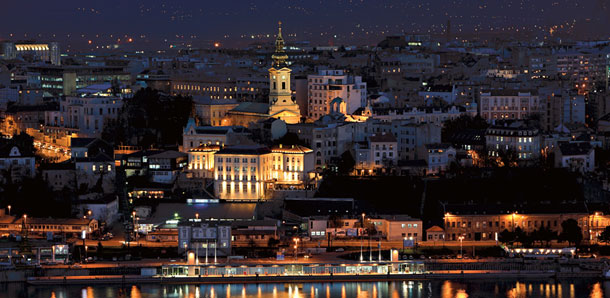I
"WHITE CITY"
II
M
u
t
e
ness
or the Language of Liberated
Hu
ma
nk
in
d
SOUND POETRY OF THE RUSSIAN FUTURISTS
by
Dmitriy Nikolaev
I
"WHITE CITY"

von
Arsenije Jovanovic
CLICK HERE FOR SOUND

Listen
A CASSETTE OF THIS PROGRAM CAN BE ORDERED FROM THE "ORF TONBANDDIENST"
| In Erinnerung an jene Massenproteste in Belgrad, mit denen die Bevölkerung ihren Widerstand gegen eine machtbesessene und korrupte Regierung zum Ausdruck brachte, hat der Belgrader Künstler Arsenije Jovanovic diese Radioarbeit realisiert. "Es sind akustische Reminiszenzen" sagt der Autor. Denn auch die Protestierenden in Belgrads Straßen wußten die Akustik als "Medium" ihrer Macht zu nutzen. "Sie verwendeten alles, was Geräusche und Klänge erzeugt", erzählt Jovanovic: "Alle Arten von Tellern und anderen Küchenutensilien, Möbelteile, Radios, Glocken, Pfeifen, Autosirenen, alle möglichen Musikinstrumente, die verfügbar waren. Sie nutzten ihre eigenen Stimmen und die ihrer Haustiere. Ihre Geräusche und Klänge schallten von Balkonen und Fenstern, von Dächern und Terassen, aus Autos und von Fahrrädern aus. Sie waren überall: auf Gehsteigen ebenso wie auf Bäumen. All diese Klänge und Geräusche ergaben eine einzigartige akustische Flut, die die Stadt überströmte und alles zum Schweigen brachte, sodaß nichts anderes mehr zu hören war - vor allem nicht die propagandistischen Sendungen des staatlichen Radios und des Fernsehens". A. Jovanovic nennt dies "Paradoxismen des Lärms": Klang gegen Klang. Radio gegen Radio. Medium gegen Medium. Ein akustischer Krieg war ausgebrochen, ein tönender Alptraum, der etwas Futuristisches an sich hatte. Es klang - so der Autor - wie ein akustisches und musikalisches Experiment mit tausenden von Mitwirkenden. "White City" vermittelt den HörerInnen Eindrücke dieses politisch-akustischen Großereignisses, von dem die ganze Welt Notiz genommen hat. Erzählt wird auch das Schicksal eines demonstrierenden Tuba-Spielers. Ein Mann, der niemals zuvor Tuba gespielt hatte, wie Jovanovic weiß: "Er hatte überhaupt keine musikalische Ausbildung, das Instrument hatte sich rein zufällig in seinem Haus befunden. Er nahm von seinem Balkon aus in einer der größten Straßen der Stadt an der allgemeinen "Performance" teil und wahr sehr froh, daß er quasi einen Platz "am Podium" des "größten musikalischen Ereignisses aller Zeiten" einnehmen konnte. Unglücklicherweise war sein Herz in keiner guten Verfassung. Mitten im "Konzert erlitt er einen Herzanfall. Man sagt, daß er noch im Sterben bat, mit seinem Instrument begraben zu werden". Dieser Tuba verleiht Jovanovic die Bezeichnung "Euphonium" - wenngleich er zugibt, nicht so genau zu wissen, um welchen Typus es sich dabei tatsächlich gehandelt hatte. Denn der Terminus "Euphonium"- im Englischen "euphony" (Wohlklang) bezieht sich in diesem Stück auf die Rolle des Tuba-Spielers als Teil eines riesigen Klangorchesters. "White City" wird vom Autor "Singidunum" genannt - die alte keltische oder römische Bezeichnung für Belgrad. Damit will . Jovanovic auf die universelle Metaphorik von "White City" verweisen: Die konkrete territoriale und politische Bedeutung sollte nicht zu stark in den Vordergrund treten. Arsenije Jovanovic lädt seine HörerInnen dazu ein, während der Ausstrahlung von "White City" selbst am Ereignis teilzunehmen - wenn auch zeitversetzt. Erlaubt ist alles was gefällt und was die Nachbarschaft gerade noch tolleriert: Küchenutensilien, Möbel und..."was auch immer zu diesem Zweck griffbereit ist - sogar ein anderes Radio, das ein anderes Programm zur selben Zeit spielt....". Ob auch Tuba-Spieler zur Sendezeit zu ihrem Instrument greifen sollten - diese Entscheidung überläßt Arsenije Jovanovic gerne den betreffenden HörerInnen selbst. |
II
M u t e ness or the Language of Liberated Hu ma nk in d
SOUND POETRY OF THE RUSSIAN FUTURISTS
by
Dmitriy Nikolaev
CLICK HERE FOR SOUND
A CASSETTE OF THIS PROGRAM CAN BE ORDERED FROM THE "ORF TONBANDDIENST"
| Produced by: | Dmitriy Nikolaev |
| Music arranged by: | Julia Dmitriukova |
| Recording Engineer: | Andrey Zachesov |
| Performers: | Olga Sirina, Ludmila Shuyskaya, Igor Vetrov, Alexander Tereshko |
| Duration: | 21'10" |
| At the beginning of the century a group of young poets, artists, composers got together to find a new and role of art in society. They saw how art, overloaded with the ballast of its classical heritage, was sinking in he sea of petit bourgeoise interests. The Futurists rejected the role of the artist serving the public as a footman and a lackey. The public whose main demand was: "Let me see beauty like on the stage of the Bolshoi ballet". The Futurists didn't want to be servants but creators of a new art, a new world and a new universe. New sound language - "language of the liberated humankind", based not on the meaning but on its sounding, was supposed to be the first step towards the Future.
SCRIPT - Part 1: Creation of a new language
SCRIPT - Part 2: Victory Over the Sun
SCRIPT - Part 3: Poetry of the machines
SCRIPT - Part 4: Catastrophies
SCRIPT - Part 5: The End
|
